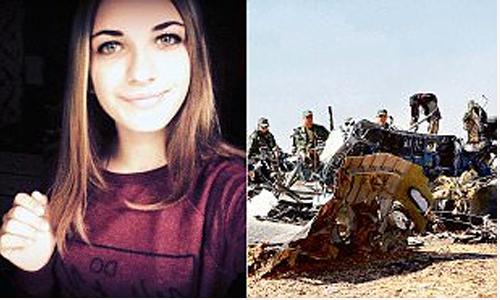Explosives were hidden under teen's seat : Russia - Sinai air crash
This young girl was sitting on top of the bomb that brought down the Russian jet when it went off with the force of 'a kilo of TNT' from underneath her seat.
Maria Ivleva, 15, is thought to have been the first to die in the tragedy above the Sinai as crash investigators narrowed down the source of the explosion to underneath one of two seats.
Investigators say the bomb, which killed 224 people, was underneath either seat 31A, where Maria was sat, or 30A, where 77-year-old Nadezhda Bashakova was sitting directly in front of her.
Investigators said it is likely that those directly on and behind the seats were killed instantly when the bomb went off with the force ‘equal to a kilo of TNT’.
However, others will have suffered in the panic of the explosion for much longer as the plane plunged from 31,000 feet at a rate of 6,000 ft per minute before hitting the ground.
The epicentre of the explosion was discovered thanks to chemical and other forensic tests on the Airbus A321, according to a report released today by Russian news organisation LifeNews.
One theory is that the bomb could have been placed under the seat in the space where the lifejacket is usually located.
The blast zone for the bomb, which Isis has claimed responsibility for, would have spanned across six rows of seats and left a huge hole in the tail of the plane which sent it tumbling out of the sky at a rate of 6,000 ft per minute.
'Investigators and secret service experts managed to locate the seat under which the terrorists planted the bomb which destroyed Airbus A321,' said the report in the pro-Kremlin media.
'The bomb which was equal to one kilo of TNT exploded and its forces went forwards and hit the rows up to 27. The wave went slightly backwards too and hit the row 32.
'The experts who tested the parts and bodies noted that the people who occupied the seats near the bomb, almost certainly died at once.'
The seats - and those around 30A and 31A - were occupied by Russian tourists who had been to Sharm El Sheikh.
There is no suggestion they were suicide bombers, instead they were seen as innocent victims among the 224 who perished in Russia's worst-ever air disaster.
Instead the Russian authorities are working closely with the Egyptians and British - who first provided intelligence suggesting a bomb was on board - to discover who planted it.
Plane records show that seat Nadezhda Bashakova, from Volkhov in St Petersburg region, was travelling with her daughter Margarita Simanova, 43, who was next to her in 30B.
The mother and daughter were experienced travellers and a year earlier had visited Goa before being killed in the tragedy while returning from a trip to Egypt.
Maria Ivleva, also from the St Petersburg region, was with her mother Marina Ivleva, 44, who was in the seat next to her, 31B.
The Airbus A321 disappeared 23 minutes after leaving Sharm el-Sheikh - a resort that 3million Russians visit every year - en-route to St Petersburg.
Initially, both Russia and Egypt denied that a bomb was responsible for the crash, but over the last month, more and more evidence has come to light suggesting the crash was down to terrorists.
The sound of the explosion could actually be heard on the black box flight data recordings, which led investigators to rule out any possibility of anything other than a bomb bringing the flight down.
Senior officials in the US and UK analysed the recordings and said they were 99.9 per cent that the sound heard on the Metrojet flight from Sharm el Sheikh to St Petersburg was a bomb.
Spies also analysed terrorist chatter, and Russia finally acknowledged on November 17 that a bomb was responsible for the crash after Britain shared intelligence with Moscow.
After the attack, Alexander Bortnikov, head of the FSB security agency told Russian President Vladimir Putin: 'One can say unambiguously that it was a terror act.'
President Putin has vowed to avenge the perpetrators: 'It's not the first time Russia faces barbaric terrorist crimes.'
He said: 'It's not the first time Russia faces barbaric terrorist crimes,' adding that his country would 'never forget' such attacks, adding that the
'Killing our people at Sinai is among the most bloody crimes judging by the number of victims. And we won't wipe our tears away from our hearts and souls. It will remain with us forever.'
- Plane went down over the Sinai on October 31 in disaster killing 224 people
- Forensic tests have now revealed bomb was stuffed under seat 30A or 31A
- Maria Ivleva, 15, was in 31A and travelling back from holiday with mother
- Nadezhda Bashakova, 77, was in 30A, and it's thought both died instantly
Related Posts

